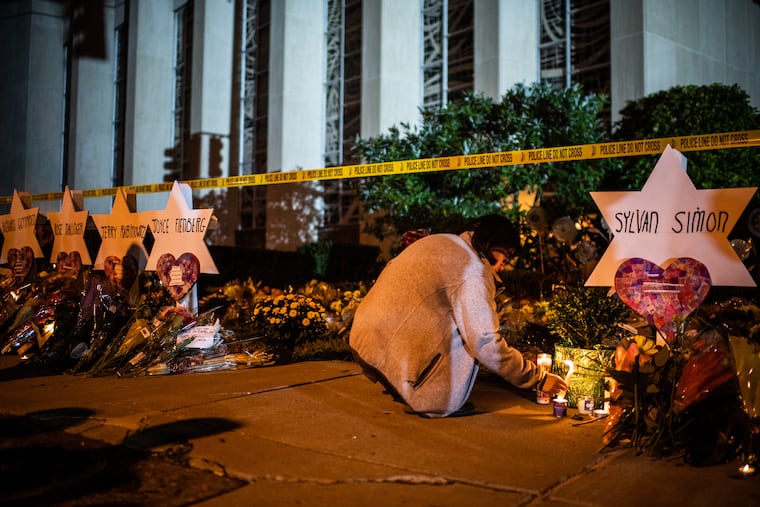Tree of Life shooting trial offers a grim reminder of failed policies and growing hate | Editorial
Robert G. Bowers is accused in the massacre at the Pittsburgh synagogue, where a deadly mix of rising antisemitism and easy access to guns fueled a shooting spree that claimed 11 lives.

The federal trial involving the man accused of killing 11 people at the Tree of Life synagogue in Pittsburgh provides a window into a host of issues roiling the country, including the rise of antisemitism, easy access to guns, lack of mental health services, and the debate surrounding capital punishment.
Robert G. Bowers, 50, faces 63 hate crime and gun-related charges from the October 2018 attack. While the facts involving the slaughter are largely undisputed, the monthslong trial is expected to focus on whether Bowers should receive the death penalty.
The mass shooting — the deadliest antisemitic attack in the nation’s history — coincided with an increase in the number of attacks on Jews and the growth of white nationalism after the 2016 election of Donald Trump, who fanned the flames of hate through his words, actions, and deeds.
» READ MORE: Pittsburgh shootings a reminder: state gun laws matter | Editorial
Tensions have continued to rise since the shooting through incitement on social media as antisemitic incidents across the country reached a record in 2021. Before the shooting, Bowers posted antisemitic slurs online, complaining of Jews, immigrants, and other “undesirables” out to take away “our jobs” and “replace us.”
Bowers, a truck driver who at one point worked for a local conservative radio host, engaged with influential alt-right figures on social media and talked of wanting to kill Jews. Minutes before entering the synagogue, he logged onto Gab, a social media platform favored by the far-right, and wrote to his followers, “I can’t sit by and watch my people get slaughtered. Screw your optics, I’m going in.”
Like so many other mass shooters, Bowers was armed for war, thanks to the easy access to guns in Pennsylvania and across much of the nation. Bowers used three Glock .357 handguns and an AR-15 assault rifle during his killing spree.
All of Bowers’ weapons were purchased legally, and he owned 10 guns in total. That anyone can own an arsenal without a second look underscores America’s disturbing infatuation with guns and the resistance of mainly Republican elected officials to implement basic gun safety measures supported by most Americans, including background checks, licensing, and a ban on assault rifles.
Hundreds of other mass shootings, and thousands of suicides and daily killings, have come and gone since the Tree of Life massacre, each one washing over a country that has seemingly become desensitized to the horror and grown despondent as state and federal lawmakers fail to act.
Finding concrete policies has been difficult since Congress declined to fund research into gun violence for decades. Researchers finally began to play catch up after Congress approved $25 million in annual funding in 2019 to the Centers for Disease Control and Prevention and the National Institutes of Health.
In Bowers’ case, defense attorneys are expected to argue that he suffered from mental issues, including schizophrenia, epilepsy, and “structural and function impairments of the brain.” That is a time-honored defense, but the majority of mass killers act out of a combination of anger and alienation aimed at an “other.” By comparison, mental health, depression, and substance use disorders are tied more to suicides.
» READ MORE: Philadelphia promised to stand with Pittsburgh after the Tree of Life shooting. Time to do it. | Editorial
The trial, which began last week, will center on the death penalty. Bowers offered to plead guilty in return for life in prison, but federal prosecutors said no. Instead, prosecutors point to the shooter’s substantial planning and premeditation, the vulnerability and number of the victims, and his motivation of religious hostility.
The families of the victims are divided over the death penalty. Some support the effort, while others oppose it and do not want to have to relive the trauma of the shootings during the lengthy trial.
While the killings are heinous, this board has long opposed the death penalty for a number of reasons, including that it is inhumane, lacks deterrence, and is often applied in an arbitrary and discriminatory manner. Beyond that, there is an additional cost to house and litigate death row inmates. There is no denying Bowers is the killer in this case, but in other instances, the death penalty poses a risk that a wrongly accused suspect may be put to death.
The United States is the only one of the world’s seven leading industrial nations that carries out executions. China, Iran, North Korea, and Yemen lead the world in executing convicts. That is not good company for the U.S. to keep — even for a despicable mass murderer like Bowers.
The Tree of Life trial raises many thorny issues lawmakers must confront. It remains to be seen if something good can come from something so horrific.